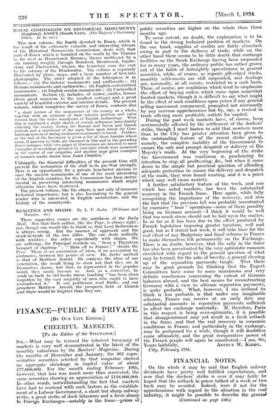FINANCE-PUBLIC & PRIVATE.
[By OUR CITY EDITOR.]
CHEERFUL MARKETS.
[To the Editor of the SPECTATOR.] SIR,—What may be termed the inherent buoyancy of markets is very well demonstrated in the latest of the monthly valuations by the Bankers' Magazine. During the months of December and January, the 365 repre- sentative securities selected by that magazine showed an aggregate shrinkage in capital value of about £77,000,000. For the month ending February 19th, however, that loss was much more than recovered, the same securities showing an appreciation of £118,000,000. In other words, notwithstanding the fact that markets have had to contend with such factors as the establish- ment of a Labour Government, a short but sharp railway %trike, a great strike of dock labourers and a fresh slump in Foreign Exchanges—notably in the frane—priew of public securities are higher on the whole than three months ago.
To some extent, no doubt, the explanation is to be found in the strong technical position of markets. On the one hand, supplies of credits are fairly abundant owing in part to the dullness of trade, while on the other hand there seems to be little doubt that contango facilities on the Stock Exchange having been suspended for so many years, the ordinary public has rather grown out of the habit of fortnightly speculations in general securities, while, of course, as regards gilt-edged stocks, monthly settlements are still suspended, and dealings are, nominally, at all events, restricted to a cash basis. These, of course, are conditions which tend to emphasize the effect of buying orders which come upon somewhat limited markets, though it is difficult to say what might be the effect of such conditions upon prices if any general selling movement commenced, prompted not necessarily by any nervous apprehensions but by, say, a revival in trade offering more profitable outlets for capital. During the past week markets have, of course, been sentimentally affected by the settlement of the dockers' strike, though I must hasten to add that nowhere more than in the City has greater attention been given to the outstanding feature of the recent strike period, namely, the complete inability of the Government to ensure the safe and prompt despatch or delivery of His Majesty's mails. At the very beginning of the strike the Government was vociferous in proclaiming its intention to stop all profiteering, &c., but when it came down to the simple but practical question of affording adequate protection to ensure the delivery and despatch of the mails, they were found wanting, and it is a point which may well cause anxiety.
A further satisfactory feature of the week, and one which has aided markets, has been the substantial recovery in the French franc. Here again, while fully recognizing the importance of the recovery, and also the fact that the previous fall was probably accentuated by excessive " bear " operations—some of them possibly being on German account—I think it would be well that too much stress should not be laid upon the matter. In so far as it has been due to the effect produced by French legislation imposing greater taxation, well and good, but as I stated last week, it will take time for the real effect of any Budgetary and fiscal reforms in France to make themselves felt permanently on the Exchange. There is no doubt, however, that the rally in the franc has also been accentuatedby the very optimistic rumours circulated with regard to the general question of what may be termed, for the sake of brevity, a general clearing up of the reparation payments tangle. That there may be good grounds for thinking that the Expert Committees have come to some unanimous and very definite conclusions concerning the extent of German balances abroad, and the best means for reconstructing Germany with a view to ultimate reparation payments, is quite probable. What, however, I am inclined to think is less probable is that under any imaginable schemes, France can receive at an early date any substantial amounts in reparation payments sufficient to affect her exchange materially. If, therefore, Paris in this respect is being over-optimistic, it is possible that disappointment may yet result in a fresh setback in the franc, and that the real recovery in economic conditions in France, and particularly in the exchange, may be postponed for a while, though it will doubtless come ultimately, and the great recuperative power of the French people will again be manifested.—I am, Sir,










































 Previous page
Previous page